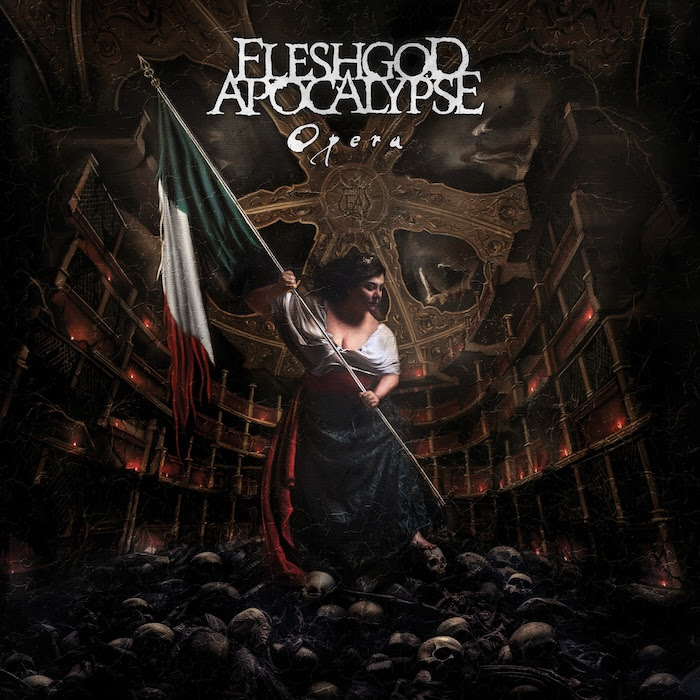Fleshgod Apocalypse – Opera

- Ode to Art (De’ Sepolcri)
- I Can Never Die
- Pendulum
- Bloodclock
- At War With My Soul
- Morphine Waltz
- Matricide 8.21
- Per Aspera Ad Astra
- Till Death Do Us Part
- Opera
Fleshgod Apocalypse has long been a towering presence in the symphonic death metal scene, carving out a niche with their grandiose blend of blistering aggression and classical grandeur. Over the course of their seventeen-year career and six albums, the Italian band has consistently pushed the boundaries of the genre. After many releases, a band may choose to reinvent themselves in such a way that begins a new era in their history. In many ways, their latest release, Opera, fulfills this role—albeit in a more fitting and conceptually rich manner.
Opera is more than just a collection of songs; it’s a profound artistic statement that delves deep into the psyche of frontman Francesco Paoli. In 2021, Paoli experienced a life-altering event when a rock-climbing accident left him severely injured, entangled in ropes, and dangling precariously from a cliff. The traumatic experience necessitated nerve transfer surgery and a prolonged period of recovery, during which much of the material for Opera was conceived. This album is a concept piece that not only chronicles Paoli’s personal journey of survival and recuperation but also explores themes of struggle, guilt, and redemption with an emotional depth that is rare in the genre.
Musically, Opera is Fleshgod Apocalypse’s most ambitious work to date, building on the exploratory nature of their previous album, Veleno, while pushing their sound into new territories. The band has always been known for their bombastic, orchestral approach to death metal, but on Opera, they place a greater emphasis on melody and intricate songcraft. The album seamlessly blends the band’s signature symphonic elements with a more diverse array of musical influences, resulting in a rich and varied sonic landscape.
One of the most significant changes on Opera is the expanded role of opera singer Veronica Bordacchini. Now a full-time member, Bordacchini’s presence is felt throughout the album, often co-leading the vocals alongside Paoli. Her commanding performance on tracks like “I Can Never Die” elevates the material, transforming the chorus into a powerful and anthemic singalong. On “Till Death Do Us Part,” her vocals bring a delicate, almost ethereal quality to the downtempo verses, showcasing a new side of Fleshgod Apocalypse that balances their trademark intensity with moments of surprising vulnerability.
This vulnerability is also reflected in Paoli’s lyrics, which delve into deeply personal and emotionally charged themes. The chorus of “Matricide 8.21” is particularly striking, as Paoli sings an apologetic plea to his mother: “Sorry for making you pray for me! Mother, forgive me!” This heartfelt expression of guilt and remorse stands out in a genre more often associated with themes of violence and brutality. Elsewhere on the album, “Bloodclock” vividly recounts the nightmarish visions Paoli experienced while hanging from the cliff, while “Per Aspera Ad Astra” is a declaration of his determination to overcome his injuries and reclaim his life.
While Opera represents a significant evolution in Fleshgod Apocalypse’s sound, it also pays homage to the band’s earlier work. Tracks like “Bloodclock” and “At War With My Soul” hark back to the heaviness and intensity of their 2016 album King. “Bloodclock,” with its relentless pace, hooks, and massive choral backing, showcases the band’s ability to create music that is both technically impressive and emotionally resonant. “At War With My Soul,” with its militaristic march and chugging riffs, calls to mind the punishing power of earlier tracks like “Pendulum” while also introducing new elements that keep the music fresh and engaging.
The album’s mid-section, particularly the transition from “Morphine Waltz” to “Matricide 8.21,” is a standout moment that exemplifies the band’s ability to surprise and captivate listeners. “Morphine Waltz” is a chaotic, frenzied piece that seems to ricochet off the walls, only to give way to the more structured and melodically rich “Matricide 8.21.” This pairing highlights the dual nature of Opera, which oscillates between the unbridled aggression for which Fleshgod Apocalypse is known and the more nuanced, emotionally driven compositions that mark a new chapter in their musical journey.
In many ways, Opera is the album that Fleshgod Apocalypse has been building towards throughout their career. It’s a work that redefines the band’s identity while staying true to the core elements that have always set them apart. By embracing both their symphonic roots and their desire to explore new sonic landscapes, Fleshgod Apocalypse has created an album that is as challenging as it is rewarding, offering something for both longtime fans and newcomers alike. While it may not be the self-titled release that some might have expected, Opera serves as a powerful testament to who Fleshgod Apocalypse is today—a band that has not only survived adversity but emerged stronger and more creatively vital than ever before.
Final Thoughts
Opera by Fleshgod Apocalypse stands as a monumental achievement in the band’s discography, representing both a return to form and a bold leap forward. It’s an album that encapsulates the essence of what has made Fleshgod Apocalypse a unique force in the metal world—unrelenting intensity, symphonic grandeur, and technical mastery—while also pushing into new emotional and musical territories. The expanded role of Veronica Bordacchini and the deeply personal lyrics from Francesco Paoli add layers of complexity and vulnerability, elevating the album beyond mere spectacle to something truly profound.
